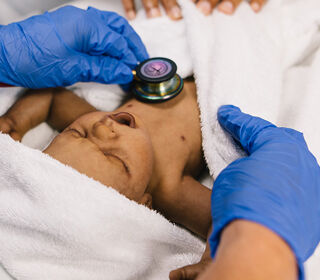
Blog Article

 Rebecca Govan
Rebecca Govan
Doctoral Researcher in Health, Education and Life Sciences
International FASD Awareness Day, symbolically on 9 September each year, draws attention to Fetal Alcohol Spectrum Disorder (FASD).
Rebecca Govan is a PhD student and assistant lecturer in the BCU Social Work department exploring the social work support available for families who have adopted a child with diagnosed or suspected FASD.��
She’s also Mum to a wonderful daughter with Fetal Alcohol Spectrum Disorders (FASD).
In this blog, co-authored with parent carers from FASD Southwest,��Rebecca busts commonly held assumptions about FASD, to raise awareness about the often-misunderstood condition.
1. Only women who are binge drinkers or dependent on alcohol are at risk of having babies with FASD…
We now know there is no safe amount of alcohol that can be consumed in pregnancy.
Since 2016, the advice from the has been ‘it is safest to avoid drinking alcohol in pregnancy’.
it’s interesting that this advice has been the standard in other countries for longer that it has in the UK (Choate et al., 2019; Mukherjee et al., 2015). In so many ways, we’re just catching up.
2. FASD is diagnosed due to the facial features…
The ‘sentinel’ facial features that are particularly related to alcohol exposure in utero have historically been a diagnostic tool for FASD (del Campo, 2021).
However, these are only evident in a low percentage of the population with FASD (Aiton, 2021).
The majority of children born with FASD don’t have the facial features and other aspects of their presentation need to be considered in order to make a diagnosis (Kable, 2021).��
3. FASD can’t really be diagnosed…
In 2022, the were launched in England by the National Institute for Health and Care (NICE). These follow on from the already in place in Scotland.
The guidelines were introduced alongside the , giving ��clinicians clear criteria for diagnosis.
4. A diagnosis of FASD means greater risk of mental health problems….
The mental health difficulties faced by people with FASD are known as ‘secondary disabilities’.
Research suggests that this is not a fundamental part of the condition, but in fact due to a lack of support and understanding (Streissguth et al., 1999).����
5. Children with FASD will grow out of the issues they experience…
FASD is a lifelong disability impacting all areas of a person's life (Hanlon-Dearman, 2021; Streissguth et al., 1999). ��
6. FASD is rare…
International FASD studies have consistently reported that this isn’t a rare condition (Petrenko and Alto, 2017; Popova et al., 2023).
In 2021, a study by the University of Salford showed that FASD is more common in the UK than Autism (McCarthy et al., 2021).����
7. It’s not FASD it is Autism…
FASD can be linked to over 400 other conditions and is often diagnosed alongside Autism and/or ADHD (Mukherjee; Popova et al., 2016).
However, it’s a distinct condition that requires tailored interventions.������
8. How could someone intentionally harm their baby like that?
The stigma experienced by birth mothers of children with FASD is a significant barrier to seeking support and accessing services (Corrigan et al., 2017; Key et al., 2019; Roozen et al., 2022).
Not only do sentiments like the statement above increase blame and shame, but they also correlate to the way funding is allocated to the ‘deserving’ versus ‘undeserving’.
This perpetuates the challenges faced by families and people with FASD (Corrigan, 2004).����
9. They cannot have a disability because they are good at xyz…
The majority of people with FASD present with what is known as a ‘spiky profile’.
This means they’re able to function well in some areas and not in others. This can vary from day to day, depending on the environment, sensory issues, and their physical and emotional state (Charness, 2022; Hanlon-Dearman, 2021).����
10. Parents of FASD children are anxious and need parenting courses/therapeutic support…
As FASD is a mostly hidden disability, parents and carers often face challenges in seeking support (Del Corral Winder et al., 2023; Mukherjee et al., 2013) – which is only available from the voluntary sector and other families in the same situation (Black, 2021).
This often impacts their wellbeing and mental health.
In particular, post-adoption support can focus on therapeutic parenting and attachment as the core intervention with adopted children (Anthony et al., 2019).
However, an understanding of FASD and brain-based models of care could lift the blame from parents and carers and increase understanding of this neurodevelopmental disability and their child’s needs, to provide more appropriate support (Petrenko and Alto, 2017; Reid et al., 2022).��